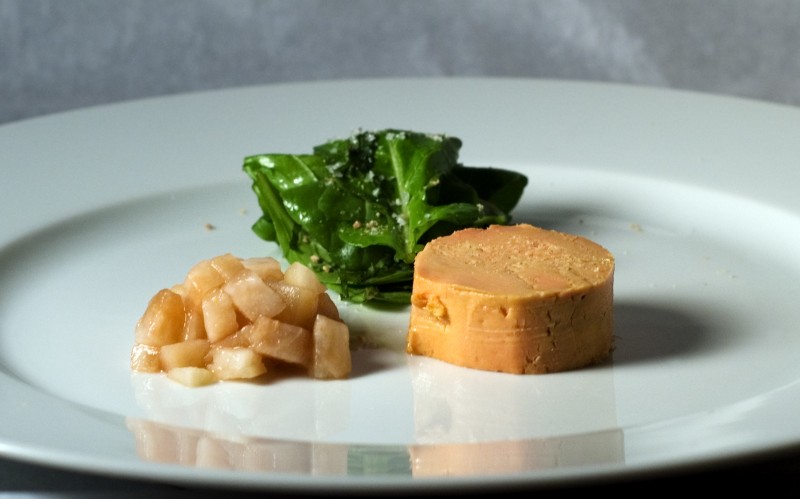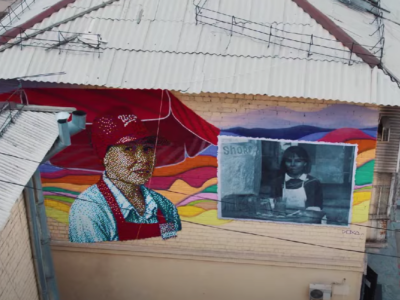
Moulard duck foie gras with pickled pear. Wikipedia image.
It was his Marie Antoinette moment; the throwaway comment that revealed him to be painfully out of touch with the economic reality and growing inequality inside his oil-rich country. And the Internet duly fish-slapped him for it.
Kazakhstan's President Nursultan Nazarbayev, 75, commands considerable popularity in the 17 million-strong ex-Soviet state he has ruled over since before independence in 1991.
But there is also a growing demographic in the Central Asian country that wants change.
This mostly consists of young people tired of a system burdened by inefficiency and corruption and an economy that hinges on the global price for oil. Many of them live on Facebook and Twitter.
It was this same demographic that exploded when Nazarbayev said on September 7 during a working visit to the Akmola region in central Kazakhstan:
Самое главное, что покушать у нас есть…Все остальное, к примеру, западная одежда – можно прожить и без этого. Правда? Без фуа-гра, бананов, вредных вообще для нас…Без самых лучших, огромных Ленд Крузеров тоже можно прожить.
The most important thing is we have food. Everything else — Western clothes — we can live without. Correct? Without foie gras, bananas, which are harmful for us […] we can also live without the best, hugest Land Cruisers.
Назарбаев призвал народ понять рост цен на бензин и отказаться от фуа-гра http://t.co/XBI5IpNy0V pic.twitter.com/0n4sKZCinv
— Агентство Рейтер (@reuters_russia) September 7, 2015
Nazarbayev called on the people to understand the rise in fuel prices and not eat foie gras.
The context for Nazarbayev's comments is bottom-of-the-barrel prices for Kazakhstan's main export: crude oil.
The collapse in the global oil price, as well as the economic meltdown in neighbouring Russia, has ushered in an era of austerity in Kazakhstan, which recorded impressive GDP growth in the first decade after the millennium.
Yet even during times of peak oil, not all Kazakhs had been getting foie gras takeaways in their Land Cruisers. Many had never even heard of the duck or goose liver speciality.
They were quick to let him know:
Тот самый случай когда ты не разу не пробовал фуа-гра, а тебе уже запрещают её есть. pic.twitter.com/yp1HYXoUYC
— Nikolay (@Nikolay_ll) September 9, 2015
[In the picture: Our version of foie-gras] That time when you had never tried foie gras and they banned you from eating it.
Фуагра точно не сможем уже покупать 😛😅😅 https://t.co/NcG6axx2jh
— Бек (@beshtash) September 9, 2015
[Title of the tweeted article: After parliamentary elections, prices will go up by 15%] Now we really won't be able to afford foie-gras!
In a bizarre defence of the president's bizarre comments, Nazarbayev's press-secretary Dauren Abaev said that his “figurative expression” had allowed Kazakhs to “let off steam”.
Abaev noted Nazarbayev was working “without rest” for the country's benefit, but did not comment on why he thought bananas were harmful.
As always, the regime was indebted to an army of online supporters (or perhaps just one person writing something very similar again and again) who spammed the comments section on Tengri News, the independent media outlet where the foie gras quotes first appeared:
народ конечно понимает, что это образное выражение. мы с Елбасы, мы за единство Казахстана! Народ всегда вместе с Лидером!
Of course the people understand that this was a figurative expression. We are with Elbasy [Nazarbayev's ‘Leader of the Nation’ title], we are for the unity of Kazakhstan! The people are always with their leader!
After nearly three decades in the hotseat, Nazarbayev is not about to lose his political mojo over one slip of the tongue. But what lessons, if any, can he and his communications team draw from this episode?
Writing on Facebook Rinat Balgabaev had some hard-to-hear but useful advice for the people at the top:
В кризисный период, если нет пока пряников для раздачи, PR должен работать точечно, и очень тонко, чтобы не усугубить ситуацию. Когда субъект пиара любит импровизировать, причем опираясь на свой жизненный опыт, очень важно, чтобы этот опыт был актуальным в текущий момент.
При всем его алармизме в предыдущих выступлениях, он себя уже давно не может оценить объективно, и не принимает свою роль в создании этого кризиса.
При чем, при таких сложных субъектах пиара, как президент, который одновременно является и объектом пиара, т.е. его потребителем, трудно спрогнозировать и тем более регулировать процесс импровизации.
Можно конечно, но, трудно. Например, не вкладывать ему в уста Ленд Крузеры, которые могут обрасти фуа-гра, или, прости, Господи бананами.
In times of crisis, if there are no cakes to hand out, PR should work punctually, and very subtly, so as not to aggravate the situation. When the subject of PR loves to improvise, speaking from his own life experience, it is important that that experience speaks to the present moment.
In the case of such difficult subjects of PR like the President, who is at the same time also the main object of PR (i.e. its main consumer), it is difficult to predict — let alone regulate — the process of improvisation. It is certainly possible, but difficult.
After all, for all [Nazarbayev's] alarmism in previous speeches, he has long been unable to assess himself objectively, or accept his own role in creating this crisis.
But you can start by not putting Land Cruisers into his mouth, which might grow into foie gras or, forgive me God, bananas.






